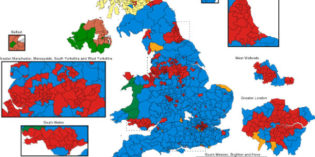
Tommy Robinson and the UK’s post-EDL far right: how extremists are mobilising in response to online restrictions and developing a new ‘victimisation’ narrative
After protests in London following the imprisonment of far-right activist Tommy Robinson, William Allchorn examines the changing strategies of the UK’s fringe extreme-right groups in recent months, which include a concerning revival of street protest, mobilising around a narrative of victimisation.

The Supreme Court’s decision on Northern Ireland’s abortion law – what now?
Kathryn McNeilly, Fiona Bloomer and Claire Pierson explain the background and implications of the recent ruling which, although found Northern Ireland’s abortion law to be incompatible with human rights law, dismissed the case on technical grounds.

Why don’t immigrants vote more?
There are relatively few cases where non-citizen immigrants can vote in municipal elections, but where they can participation tends to be low. Didier Ruedin assesses the case of Geneva, where he finds that, even accounting for social origin, engagement, civic integration and socialisation, there is a gap in participation that needs further explanation.

Book Review | The UK after Brexit: Legal and Policy Challenges edited by Michael Dougan
In the edited collection The UK after Brexit: Legal and Policy Challenges, Michael Dougan brings together contributors to explore the key challenges facing the UK legal system and broader public policy environment following the UK Brexit vote and resulting de-Europeanisation process. This comprehensive work gives prime insight into the profound restructuring of the UK’s institutional landscape that may be on the horizon, writes Jim McConalogue.

Understanding populism: what role do crises play in the growth of Euroscepticism?
Three distinct crises have hit the European Union in the last decade: the Great Recession, the migration crisis and Brexit. As Andrea L. P. Pirro explains, there has been a widespread assumption that populist parties with Eurosceptic profiles have been the main political beneficiaries from these crises. But there still remains much to be understood about what populists make out of such crises, as well as their impact on Euroscepticism.

How the SNP’s post-referendum membership has changed the party – and what has stayed the same
As the SNP meets in Aberdeen for its party conference, James Mitchell looks at the impact of the 2014 post-referendum surge in membership on the party’s organisation and finances, and how this precipitated the proposed changes to the party’s constitution.

General election polling goes geographical: the accuracy and value of constituency-level estimates
The 2017 general election saw a largely unremarked geographical extension to opinion polling, with three analysts publishing estimates of which party was likely to win in each of the country’s constituencies. Ron Johnston, Kelvyn Jones, David Manley, Charles Pattie, Todd Hartman, and David Rossiter have analysed their accuracy and considered the implications of that development for the conduct of future elections.

Evidence from Scotland and Wales: representatives elected via party lists are less likely to reply to constituents – but we should be careful about the conclusions we draw
Websites such as WriteToThem.com make it simple for constituents to contact their elected representatives, but how responsive are politicians to these communications? And does the system by which they are elected shape their responses? Research by Alex Parsons and Rebecca Rumbul shows that under the UK’s Additional Member Systems, constituency representatives are more likely to reply than those elected via party list. This raises further research questions about the subjects they reply about and different priorities for representatives under this system.

Out from the shadows: the case for external oversight of UK Special Forces
While the UK government maintains a strict ‘no comment’ policy about the country’s special forces, allied countries, including the US, allow for parliamentary oversight of their covert military operations. Liam Walpole argues that the UK’s approach lacks democratic accountability and prevents proper evaluation of the military effectiveness of special forces. Options for reform include expanding the Intelligence and Security Committee’s remit to cover special forces.

Book Review | Brexit and Beyond: Rethinking the Futures of Europe edited by Benjamin Martill and Uta Staiger
In Brexit and Beyond: Rethinking the Futures of Europe, editors Benjamin Martill and Uta Staiger bring together contributors to consider the possible implications of Brexit for the futures of Europe and the European Union. Available to download, the book’s interdisciplinary approach makes clear the difficulties of predicting the potential outcomes of an unfolding process while nonetheless outlining a number of different scenarios and possibilities in detail, writes Anna Nadibaidze.




 Democratic Audit's core funding is provided by the Joseph Rowntree Charitable Trust. Additional funding is provided by the London School of Economics.
Democratic Audit's core funding is provided by the Joseph Rowntree Charitable Trust. Additional funding is provided by the London School of Economics.